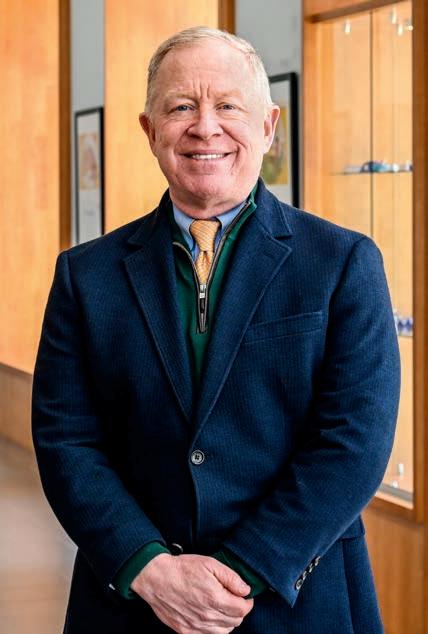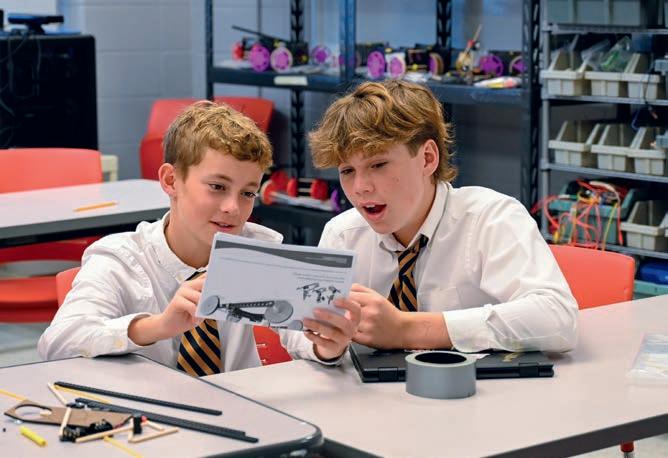
5 minute read
An Interview with Our New Head of School, Brian McBride
he uses in his leadership tool kit. By asking people to share their 4 H’s — their history, heroes, heartbreak, and hopes — colleagues are able to learn about each other’s backgrounds, ultimately building trust and deeper relationships.
What parts of your personal and professional history have brought you to this point in your career?
Advertisement
reflect on these years of my career, recognize how formative it was for my professional development, and see how it prepared me to be head of school: I gained a 360-degree perspective on the internal and external affairs of independent schools, learned the skills to hire and retain talented people, and was reminded of the importance of relationships through it all.
On July 1, 2023, Brian McBride joined the Holy Child School at Rosemont community as our eighth head of school. His 33-year career in independent school education afforded him experiences as a teacher, advisor, coach, and administrator. Brian, his wife Lisa, and sons Gavin, Tucker, Shane, and Brennan are excited to get to know our Holy Child community, and Brian brings with him a relationship-first approach to leadership. Before his first day, he sat down for an interview to reflect on what prepared him for the opportunity to become our eighth head of school. Discussing the importance of relationships, Brian emphasized the utility of his adaptation of a 4-H exercise, which
My father was an educator and coach for The Haverford School, and my journey started there, as my siblings and I were raised with the campus as our backyard. I learned from my father’s example the importance of relationships, especially connecting with your students and colleagues, and this lesson was relevant to many aspects of my early career. I attended The Wharton School of the University of Pennsylvania on an ROTC scholarship; after graduation, I spent four years in the Navy as an officer, where I essentially earned my degree in people management and learned valuable leadership lessons as 85 people were entrusted to my care. After the Navy, an opportunity to teach math at The Haverford School brought me back to the campus that I knew as home; there, I found work that I loved, serving as an educator, coach, and mentor to young men across Grades 9-12.
My transition from educator to school administrator was a pivotal time in my career. I worked as an administrator for 12 years at the McDonogh School in Maryland and gained experience in enrollment management, student life, and athletics; following that opportunity, my family and I moved back to Pennsylvania, and I worked as the associate head of school for external affairs at Haverford for another 12 years. I
Who are some heroes and mentors who have been integral to your path?
My parents — Donald and Joanne McBride — are my heroes. My four younger siblings, my parents, and I grew up as a close-knit family, having dinner together every night, and I credit my parents for teaching us the importance of family and faith. We were raised Catholic, and through challenging times of my life, I have leaned on the foundation of faith that my parents instilled in me.
I also consider my father to be one of my mentors and my ultimate hero. Throughout my career, I sought advice and guidance from him because of his years of experience in education. I have been blessed with having tremendous mentors during my career, including Bo Dixon, who gave me my first opportunity as a teacher. I worked alongside him at both Haverford and McDonogh where, at each school, he had served as head. Bo taught me a great deal about leadership and how to effectively lead school communities.
As you reflect on the past, what is one heartbreak that has shaped the way you lead your life?
My father’s Parkinson’s diagnosis was a particularly challenging time of my life. Family is incredibly important to me, and so we moved back to Pennsylvania to be closer to my parents. I was grateful that my father and my sons were able to enjoy more time together at the end of his life. During this time, I turned to my faith for support, and I became a daily communicant at Our Mother of Good Counsel in Bryn Mawr. I deepened my relationship with God to cope, reflect, and heal when my father passed away. Through prayer and discernment, I realized that there was an opportunity to combine my professional experience and my faith to better serve God. I believed that leading and serving a Catholic school was the way to fulfill that calling. While I have worked at many nondenominational schools in my career, most recently Concord Academy in Massachusetts, I truly feel that Holy Child is an amazing school and the right fit.
What are your hopes for the future of Holy Child School at Rosemont?
I have known the value of a Holy Child education for many years; I saw it evidenced in the Holy Child graduates who we admitted to Haverford’s Upper School when I worked there. I am excited to be here and feel that I can be an effective leader because my values and faith align with those of the school and the people in our community. I strive to build on all of the great things that Tom Lengel established during his tenure and to continue “meeting the wants of the age,” as Cornelia Connelly urged. My hope for the future is to continue developing and shaping young learners at Holy Child, supporting their talents and highlighting their potential, especially during the transformative educational years that they spend at our school.
Read more about Brian’s professional history on our website: www.HolyChildRosemont.org/ headofschool
Exploring Technology and Design Through Middle School Technology Class

On the third floor of the Academic Building lives our MAD Lab — the Media, Arts, and Design Lab — where technology classes are taught to Middle School students. However, the moniker for the class does not fully represent the range of rich and complex subject areas explored in the MAD Lab, including computer science, coding, 3-D design, augmented and virtual reality, engineering, and physics. Rooted in project-based learning, our Middle School technology classes provide students with hands-on experiences that make room for creativity, exploration, and discovery. An added bonus is that there are two teachers in the classroom, Joe Savitsky P’23 and and Pat Mangan, and they are able to develop the curriculum together and work with students in small groups on exploratory pursuits that run tangential to the lesson of the day. Creativity and collaboration are key components of every technology class, but understanding the inner workings of their creations is what enables our students to ask critical questions.
Middle School faculty member Joe Savitsky P’23 shares how the discovery process in tech class stands apart from other subjects, saying, “What I like to listen for is when the students ask, ‘What if…?’ In other subject areas, students ask these questions and find answers through their teachers and research. In tech class, students can answer these questions for themselves by experimenting with modifications to the design of the project, gaining a greater understanding of the inner workings of everyday things.”
One example from this school year is when our Grade 8 students assembled Bluetooth speakers; beyond learning and discussing the necessary parts that create a speaker, the students also explored the science of sound waves and Bluetooth technology. In a full-circle moment, our Grade 8 students used one of the class-made Bluetooth speakers to play music for the whole student body in a packed O’Neill Gymnasium during the Homecoming Pep Rally.







